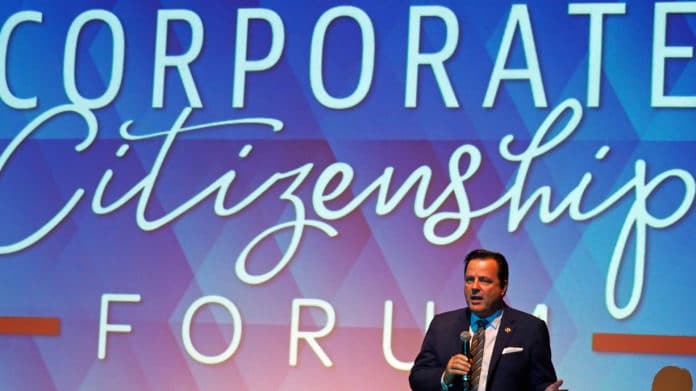Customers, investors and employees are increasingly interested in seeing corporations leverage their strengths in ways that help resolve a host of global issues ranging from human rights, health, and food production, to housing, global warming, transportation, water supplies, education and more.
An all-day Corporate Citizenship Forum hosted by the Arlington Chamber of Commerce Foundation – though dealing with complex societal changes in the world of business – could be boiled down to a critical component: Business is in the midst of a responsibility revolution.
Held earlier this month, the forum brought in 24 speakers from an array of business enterprises, all of them delivering their perspective and efforts on CSR – Corporate Social Responsibility.
The perspectives were varied, ranging from travel industry expert/philanthropist Dan Dipert and urban missionary Tillie Burgin to U.S. Chamber of Commerce Vice President Marc DeCourcey and radio personality Rocky Turner.
“We want people to understand that they can do good things for their business and good things for the community,” Chamber President Michael Jacobson said. “They’re not exclusive.”
Jacobson adds that while it’s commendable when businesses simply write a check for a service project, there’s a higher and more efficient view: “Corporate responsibility has to be strategic with an eye on purpose and impact. Philanthropy and nonprofits can’t do it all.”
About 100 business leaders attended the forum, which Jacobson said he believed to be the first session of its kind in the Metroplex.
Hannah Nokes, a forum keynote speaker and CEO of Magnify Impact, said the traditional three-point model of corporate business – do no harm, serve stockholders and customers – was expanding under changing societal pressures.
“The workplace really is changing,” Nokes said. “Everyone has access to shared information via shared media, creating an unprecedented voice in the consumer base.”
In translation, this means corporations will increasingly be expected to leverage their strengths in ways that help resolve a host of global issues ranging from human rights, health, and food production, to housing, global warming, transportation, water supplies, education and more.
In addition to social media and shared information, Nokes said there are other critical changes contributing to the CSR movement. Those include:
• Millennials: This year this number of millennials (born 1981-96) matched the number of baby boomers, about 71 million. “Millennials will be 75 percent of the work force by 2025,” Nokes said. “They care deeply that companies they support and work for are actively engaged with solving the world’s most challenging problems.”
• Gen Z-ers: These will be the first true digital natives (born 1997 to present and 72-million strong) who have never lived in a world without Wi-Fi, the Internet, Facebook, texts and YouTube. “They’ll be 40 percent of the consumer base by 2020 and growing from there,” Nokes said. “As a group they demand more flexibility in their jobs, more efficient transportation modes and – most importantly – they vote with their dollars when deciding which companies to do business with.”
• Investors: Nokes said investors are increasingly looking to invest in companies that have societal impact metrics as part of their work folio, proof they’re making a positive contribution.
• Global corporations: About 40 percent of world commerce is now conducted by international companies, amplifying potential impact of CSR policies.
Corporate citizenship policies are not, Nokes said, a one-way proposition with no return for the businesses involved.
“They create competitive advantages, positive brand I.D., create crazy loyalty with employees, engage business partners and electrify corporate culture,” she said.
Nokes cities redundant, replicated studies that also indicate:
• 86 percent of consumers think businesses should place as equal a weight on society’s interests as their business interests.
• 66 percent of consumers say they’re willing to pay more for good from brands demonstrating social commitment.
• 87 percent will purchase a product because the company advocates an issue they also support.
“That’s why companies have to seize opportunities not only to do good things but to tell their story in a way that resonates with the audience they want,” Jacobson said.
He also outlined a somewhat different role for the chamber’s foundation from the traditional, which in most nonprofits is to raise money.
“Instead, I want our foundation to celebrate and encourage and educate our businesses in helping them do more with corporate citizenship,” he said.
O.K. Carter is a former editor and publisher of the Arlington Citizen-Journal and was also Arlington publisher and columnist for the Star-Telegram and founding editor of Arlington Today Magazine. He’s the author of the definitive book on Arlington’s colorful history, Caddos, Cotton and Cowboys: Essays on Arlington.
okcarter@bizpress.net








